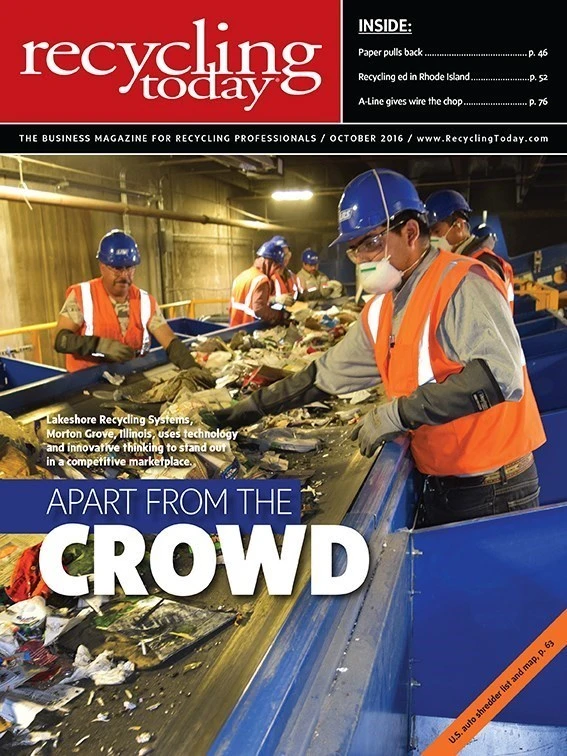New York passes ‘Slow Down to Get Around’ bill

New York Gov. Andrew Cuomo has signed into law Senate Bill 4268 (sponsored by Sen. Carl Marcellino, R-5th, and identical to Assembly Bill 7763, sponsored by Assemblyman Michael DenDekker, D-34th), which will require motorists to slow down when passing waste and recycling collection vehicles starting in November. Now enacted, the legislation is incorporated into Chapter 293 of New York state law.
New York is the 12th state to enact this legislation, commonly referred to as “Slow Down to Get Around,” which is designed to protect waste and recycling workers.
Motorists now are required to slow down around waste and recycling trucks when actively engaged in making collections when safety lights are flashing, similar to cautions motorists must now exercise when traveling through a construction work zone or when passing a stopped public safety vehicle. The new law will become effective in November. New York is the latest state to enact this legislation, which is part of a nationwide campaign by the National Waste and Recycling Association (NWRA), Washington, and its state chapter, with involvement with the Solid Waste Association of North America (SWANA).
“SWANA was an active supporter of this effort in New York,” says David Biderman, SWANA CEO and executive director. “Our chapter and members will work tirelessly throughout the state to educate drivers to ‘move over’ when driving near waste and recycling vehicles.”
The effort in New York involved a broad coalition of private waste and recycling companies, labor groups and municipal leaders in getting this worker safety measure enacted into law.
Recent data from the U.S. Bureau of Labor Statistics show waste and recycling collection ranks fifth in the nation for injuries, accidents and fatalities, and more recent data show many accidents involving collection workers are caused by inattentive motorists and distracted driving.
New York joins Alabama, Florida, Georgia, Indiana, Illinois, Michigan, North Carolina, Oklahoma, Virginia, Wisconsin and West Virginia in passing similar legislation.
Washington Department of Ecology fines Total Reclaim
The Washington Department of Ecology has fined the Seattle-based electronics recycler Total Reclaim Inc. $444,000 for illegally disposing of flat-screen televisions and monitors with fluorescent tubes containing toxic mercury. The company shipped the flat screens to Hong Kong, where they were broken apart in the open by unprotected workers, Ecology says.
“Total Reclaim has been a leading electronics recycler in Washington, so they knew what they were doing was wrong,” says Laurie Davies, manager of Ecology’s Waste 2 Resources program. “This penalty is a reminder that recyclers can’t take shortcuts when it comes to properly managing toxic chemicals.”
Total Reclaim’s actions were revealed in an investigation by Washington-based Basel Action Network (BAN), a nonprofit group that certifies electronics recyclers for E-Cycle Washington and similar programs. BAN attached GPS tracking beacons to electronics, then dropped off the units at recycling facilities. The group followed some of the trackers to Hong Kong and filmed how the flat screens were dismantled and disposed of.
Total Reclaim later admitted that it sent the flat screens to undocumented recycling facilities and that it withheld information from customers and auditors. The company provided records to Ecology that showed it shipped flat screens overseas beginning seven years ago.
Washington law requires electronics recyclers to either properly recycle e-scrap themselves or to ensure that it is legitimately recycled elsewhere.
Following the announced fine, Total Reclaim released a statement that says in part: “We understand that the Washington Department of Ecology has decided to issue a notice of penalty of $444,000 to Total Reclaim related to the export of certain products, first reported in May of this year. Although Total Reclaim will be disputing the penalty, we are fully cooperating with the agency throughout the process and stopped exporting these materials before Ecology’s inquiry began.”
The company adds, “Our goal is to continue to earn the trust our customers place in us to provide recycling solutions that meet their needs and protect human health and the environment.”
Total Reclaim says it has taken steps to improve its operations, including retrofitting equipment to capture mercury potentially liberated during processing.
AQSIQ may open up inspection procedures

A notice issued by China’s State Administration of Quality Supervision, Inspection and Quarantine (AQSIQ) says inspection procedures for imported scrap materials will change.
Monday, Aug. 15, 2016, the AQSIQ posted to its website (in Chinese only) a notice that it was preparing to make changes to rules that apply to its “imports of solid wastes as raw materials [scrap]” and “preshipment inspection agency designated issues.”
The Beijing-based China Certification and Inspection Group (CCIC) for many years has been the sole approved preinspection provider of exported scrap materials bound for China.
The mid-August 2016 AQSIQ announcement, called Notice No. 79, says China’s State Council has decided to make the changes regarding designated preshipment inspection agencies that will apply to “imported solid wastes as raw materials [scrap] and imported used machinery and electronic products.”
The changes have “entered the stage of legal review,” according to Notice No. 79.
Yet-to-be-released AQSIQ Decree No. 119 will explain the revisions. Meanwhile, AQSIQ says shippers should keep working with CCIC, which it refers to as “the original preshipment inspection agency designated to implement preshipment inspection.”

Explore the October 2016 Issue
Check out more from this issue and find your next story to read.
Latest from Recycling Today
- Call2Recycle Canada launches program in Alberta
- The history of SAS Forks: Celebrating 50 years
- SAS Forks partners with NED at Green Recycling in Houston, Texas
- DRKhorse’s RCC series at Gorick Construction in Endicott, New York
- Balar Equipment to operate under Enviro-Clean Equipment name
- Li-Cycle reports 2024 financials
- Wisconsin Aluminum Foundry acquires Anderson Global
- PureCycle, Landbell Group working to advance PP recycling in Europe





